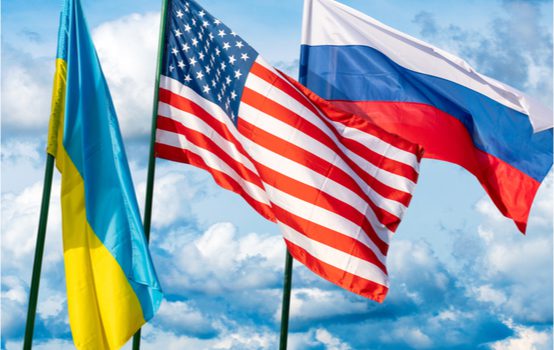The Biden Administration Is Struggling To Navigate Russia-Ukraine Relations
Tension between the neighboring countries challenges past and present American foreign policy.
(graja/Shutterstock)
JUNE 15, 2021|12:01 AM
DOUGLAS MACGREGOR
It’s been a bad month for President Volodymyr Zelensky of Ukraine. After Zelensky was “blindsided” by President Joe Biden’s decision to drop sanctions on Nordstrom II, the Russia-to-Germany pipeline for liquefied natural gas, he was also denied meeting with Biden before Biden meets with Russia’s President Vladimir Putin.
Yesterday, Zelensky blindsided the State Department right back by announcing on Twitter that NATO had approved his country’s membership, prompting a quick rebuke from Secretary of State Anthony Blinken and a denial from President Biden himself.
No worries, insists National Security Advisor Jake Sullivan, President Biden will “stand up firmly for Ukraine’s sovereignty, territorial integrity and its aspirations as we go forward.”
Zelensky should be forgiven for harboring doubts. He is now beginning to appreciate how the Polish National Leadership felt in 1939 when the British and French Governments provided a guarantee to support Poland in the event she was attacked by Germany. The guarantee proved worthless. London and Paris were in no position to stop Poland’s destruction, but they also did not even try.
In 1939, when the German-Soviet Nonaggression Pact was agreed to by Stalin and Hitler, Berlin and Moscow needed each other. The Soviets wanted German technology and technical expertise for the Soviet military buildup, as well as a border 300 miles closer to the West. Germany wanted Soviet oil, mineral, and agricultural resources for military operations against the Western Allies.
Today, Germany’s appetite for Russian resources today may be greater than it was in 1939. Germany wants to end its dependence on nuclear power by dramatically increasing its use of liquefied natural gas. In contrast to 1939, Germans do not see Russia as an existential military threat to Germany.
However, Russia’s position vis-à-vis Germany has also changed dramatically. Despite its reduced size after the loss of the Second World War, Germany’s economic strength far surpasses Russia’s, the two states no longer share borders, and Russia’s military strength—though impressive when compared to most European states—is a fraction of the Soviet Union’s. To be blunt, Moscow lacks the strength and capability to launch offensive operations against the West.
Most Russians are convinced that the takeover of Crimea is proof that Russia regained the great-power status it lost with the collapse of the Soviet Union, but Russian salaries remain low, the cost of food is rising, and the number of hospitals is decreasing. Most Russians also believe that Putin’s policies in Ukraine are primarily a reaction to NATO expansion.
There is also evidence, however, that a Russian war to subjugate Ukraine would be opposed by a majority of Russians, who believe both countries should be independent yet friendly, without hard borders, visas, or customs barriers. Perhaps more importantly, both Putin and Zelensky know there are at least 30 million Ukrainians who view themselves in terms of ethnicity, language, and culture as fundamentally different and distinct from Russians. These Ukrainians will fight tenaciously to defend their country against any Russian invasion. A war to subjugate Ukraine would be bloody and costly to Moscow in ways that might threaten the Putin regime itself.
The masquerade is over. Washington is acknowledging the limits of American military power. Washington and its reluctant NATO partners are even less willing to assist Ukraine in opposing determined Russian military action than London and Paris were 80 years ago. Make no mistake: Washington’s strategy of signing up European governments governments to hostile policies toward Moscow is losing steam.
Fortunately for the West, Putin is not Stalin and Russia is not the Soviet Union. Moscow cannot indulge its historic impulse to dominate its neighbors to the West lest it harm its economy and society. Germany’s refusal to cooperate with Washington in its schemes for permanent hostility to both Moscow and Beijing is unambiguous and public.
Meanwhile, Ukrainians are learning that, like the Finns in 1939, Ukrainians are on their own. If Kiev adopts the Finnish model, which ultimately succeeded, and abandons the self-deluding Polish model, which failed, than Kiev is far more likely to achieve Ukraine’s prosperity and security without Washington’s involvement than with it.
Do these developments bode ill for the Biden-Putin summit? It’s unclear.
In response to President Kennedy’s request for a meeting without a specific agenda, Khrushchev and JFK met in Vienna, Austria, on June 3, 1961. The meeting confirmed Khrushchev’s suspicion. JFK was not simply inexperienced; JFK seemed weak and aimless. “He just beat the hell out of me,” JFK told James Reston of theNew York Times. “It was the worst thing in my life. He savaged me.”
By every conceivable measure of national power, in 1961 the United States towered over the Soviet Union, but JFK’s disappointing performance in Vienna still had consequences. Within a few weeks, the Soviets tested JFK by dividing Berlin with a wall that stood until 1989, and 22 months later with the Cuban Missile Crisis.
President Putin will be more polite than Nikita Khrushchev, but Putin knows that Washington overreached in Ukraine and currently props up a decrepit Atlantic Alliance. In this sense every mistake is, as Ambassador George Kennan warned, a product of the mistakes that came before it. Thus, Americans and Ukrainians should treat Western media coverage of the Biden-Putin summit with skepticism and judge the event by what occurs in its wake.
For President Biden, the question is: can he jettison the confrontational behavior toward Russia on Russia’s doorstep and work instead with Berlin, Moscow, and Kiev to fashion a sustainable solution that meets European, Ukrainian, and Russian security needs?
Douglas Macgregor, colonel (ret.) U.S. Army and the former senior advisor to the Secretary of Defense, is a Ph.D., the author of five books, and a senior fellow at The American Conservative.




No comments:
Post a Comment